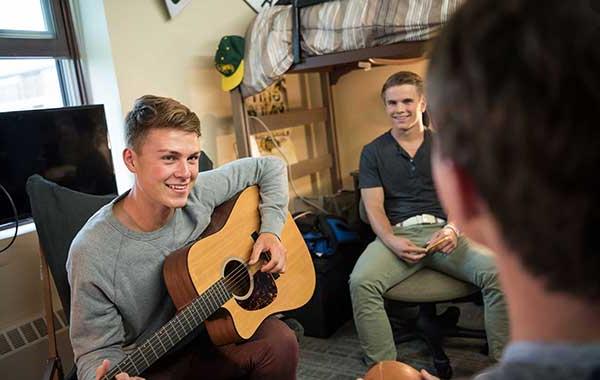Veterinary Technology
The veterinary technology program at North Dakota State University will prepare you for an exciting career in animal health care. As a veterinary technologist, you may choose to work in a large animal, small animal, exotic animal, or lab animal veterinary practice. Our graduates also find exciting careers in areas such as: serving as a research technician, working with breed and industry associations, veterinary sales and marketing, veterinary practice management, and animal‑related business management. Many potential career opportunities await you as an NDSU veterinary technology graduate.
The Program
Veterinary Technology is a Bachelor of Science degree program within the Department of Animal Sciences. Departmental offices are located in Hultz Hall and Robinson Hall, on the west side of the main NDSU campus. Veterinarians and credentialed veterinary technologists comprise the primary faculty and staff, with other animal health and animal sciences professionals also teaching in the program.
The first year of the program is a pre-professional course of study that allows students the opportunity to decide if they want to apply for the limited-enrollment professional portion of the program. Courses offered to first year students include Introduction to the Veterinary Profession, Anatomy and Physiology of Domestic Animals, and Medical Terminology for the Paraprofessional. If, for any reason, you do not continue into the professional portion of the program, the credits earned during the first year may be transferred into other majors.
The professional portion of the program, which starts in the fall of the second year, is selective. Students must submit an application by the first week in May in order to be considered for admission into the professional program. Detailed application and selection information is provided during spring semester classes and is available at http://interagency.wybxx.com/vettech.
Professional Program Selective Admission
All students wishing to continue on in the professional program must submit supplemental application materials. Transfer students are encouraged to contact the department early for information if they intend to transfer to NDSU and pursue veterinary technology. In addition to the application form, students must complete the WONDERLIC Scholastic Entrance Exam, a personal interview with selection team members, and have completed VETS 115 - Medical Terminology. During the early summer, applications are evaluated and students are notified regarding program acceptance.
Professional Program
Topics in the professional portion of the program include veterinary nursing, clinical laboratory procedures, radiography, pharmacology, anesthesiology, hospital procedures, surgical nursing, and animal disease. Students work with a diverse group of animals, including cattle, sheep, pigs, horses, dogs, cats, birds, and exotics. In addition to lectures and demonstrations, students gain a great deal of practical experience. Professional program students participate in clinical practicums and, after successful completion of all the veterinary technology courses, enroll in a clinical externship. Most students complete their externship in a veterinary clinic, but students with particular interests have done their externships at facilities such as zoos, research laboratories, and animal rehabilitation facilities. Your entire academic career is planned to allow you to achieve your career goals and adapt to individual employment needs after you graduate. A minor in large animal veterinary technology, available only to veterinary technology majors, is available for students interested in careers working with livestock and/or horses.
Veterinary Technology Curriculum
With the guidance of your faculty advisor, you will formulate a course schedule that allows you to complete the veterinary technology program requirements. With the general elective courses necessary for graduation, you will be able to satisfy the requirements for a number of minor fields of study.
Financial Aid and Scholarships
Part-time work and work-study programs are available in several different livestock units, the equine center, and in animal science laboratories within the department. Over $50,000 in departmental scholarships are awarded to students within the Department of Animal Sciences, including Veterinary Technology majors, annually. In addition, the College of Agriculture, Food Systems, and Natural Resources awards scholarships each year to incoming freshman and current NDSU students. Veterinary Technology students may also apply for the LuAnn Lee Memorial Scholarship. For more information on college scholarships, visit http://www.ag.wybxx.com/academics/scholarships.
Student loan, grant and work-study information is available from the Office of Financial Aid and Scholarships, and One Stop http://interagency.wybxx.com/onestop/finaid/.
The Veterinary Technology Club and Extra-Curricular Activities
The Veterinary Technology Club is open to any student interested in veterinary technology. It provides a social setting for students with common career goals and an opportunity to become involved in professional and community activities. The club meets twice monthly during the school year. Information about the club is available from the veterinary technology academic advisors.
NDSU offers a wide variety of other student led clubs, including the Saddle and Sirloin Club, Dairy Club, Rodeo Club, Horseman’s Association, Collegiate Cattlewomen, Range Club, Anthrozoology Club, and Collegiate FFA.
